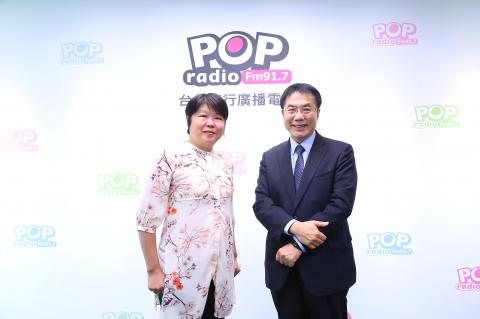Democratic Progressive Party (DPP) Legislator Huang Wei-che (黃偉哲), who is representing the party in the Tainan mayoral race, yesterday rejected allegations that he had exercised improper influence on behalf of Japanese discount store chain Daiso Industries Co.
The Ministry of Economic Affairs last week rescinded Daiso’s import permit as punishment for repeatedly importing Japanese food products that were banned following the Fukushima Dai-ichi nuclear power plant disaster.
Daiso was in July 2015 found to have imported banned products and tampered with product labels.

Photo courtesy of Pop Radio
The company later applied to renew its permit using forged documents, leading to a permanent revocation of its import privileges and a fine of NT$41.6 million (US$1.38 million).
New Power Party Executive Chairman Huang Kuo-chang (黃國昌) has said that Tseng Pi-chu (曾碧珠), Huang Wei-che’s former chief of staff, played a role in shielding Daiso from scrutiny.
Huang Wei-che said in an interview on Pop Radio that while he did arrange a meeting in early 2015 between Daiso representatives and then-minister of economic affairs John Deng (鄧振中), nothing inappropriate took place at the meeting.
He said he facilitated the 10-minute meeting because he thought Daiso could have been a good channel to sell Taiwanese products in Japan and the discussion centered on attracting investors, adding that he considered the meeting a “routine social call.”
Huang Wei-che said that it is unreasonable to assume that he, as a lawmaker of the then-opposition DPP, would have the clout to shield Daiso from the government.
Reports that Daiso had tampered with food product labels first broke in July 2015, nearly eight months after the meeting, he said, adding that blaming him for things that came to light later is unfair.
He added that Daiso has sent other representatives to his office after being fined and banned from importing, but he had “no personal knowledge” of it and was not a party in the ensuing arbitration process.
The firm would not have to forge documents to restore its import privileges if there was illegal influence peddling on its behalf, he said.
However, the financial interactions between Tseng and a Daiso affiliate, identified as a man surnamed Yeh (葉), were, while legal, troubling from an ethical perspective, Huang Wei-che said.
He said that Tseng and Yeh are currently embroiled in a lawsuit and that Tseng had told him, shortly before she left his employ, that she had loaned large sums of money to Yeh.
After acknowledging the incident as having cast a cloud over his electoral prospects, Huang Wei-che said: “I can promise that I absolutely did not take any money [from Daiso].”

Alain Robert, known as the "French Spider-Man," praised Alex Honnold as exceptionally well-prepared after the US climber completed a free solo ascent of Taipei 101 yesterday. Robert said Honnold's ascent of the 508m-tall skyscraper in just more than one-and-a-half hours without using safety ropes or equipment was a remarkable achievement. "This is my life," he said in an interview conducted in French, adding that he liked the feeling of being "on the edge of danger." The 63-year-old Frenchman climbed Taipei 101 using ropes in December 2004, taking about four hours to reach the top. On a one-to-10 scale of difficulty, Robert said Taipei 101

Nipah virus infection is to be officially listed as a category 5 notifiable infectious disease in Taiwan in March, while clinical treatment guidelines are being formulated, the Centers for Disease Control (CDC) said yesterday. With Nipah infections being reported in other countries and considering its relatively high fatality rate, the centers on Jan. 16 announced that it would be listed as a notifiable infectious disease to bolster the nation’s systematic early warning system and increase public awareness, the CDC said. Bangladesh reported four fatal cases last year in separate districts, with three linked to raw date palm sap consumption, CDC Epidemic Intelligence

Taiwanese and US defense groups are collaborating to introduce deployable, semi-autonomous manufacturing systems for drones and components in a boost to the nation’s supply chain resilience. Taiwan’s G-Tech Optroelectronics Corp subsidiary GTOC and the US’ Aerkomm Inc on Friday announced an agreement with fellow US-based Firestorm Lab to adopt the latter’s xCell, a technology featuring 3D printers fitted in 6.1m container units. The systems enable aerial platforms and parts to be produced in high volumes from dispersed nodes capable of rapid redeployment, to minimize the risk of enemy strikes and to meet field requirements, they said. Firestorm chief technology officer Ian Muceus said

MORE FALL: An investigation into one of Xi’s key cronies, part of a broader ‘anti-corruption’ drive, indicates that he might have a deep distrust in the military, an expert said China’s latest military purge underscores systemic risks in its shift from collective leadership to sole rule under Chinese President Xi Jinping (習近平), and could disrupt its chain of command and military capabilities, a national security official said yesterday. If decisionmaking within the Chinese Communist Party has become “irrational” under one-man rule, the Taiwan Strait and the regional situation must be approached with extreme caution, given unforeseen risks, they added. The anonymous official made the remarks as China’s Central Military Commission Vice Chairman Zhang Youxia (張又俠) and Joint Staff Department Chief of Staff Liu Zhenli (劉振立) were reportedly being investigated for suspected “serious